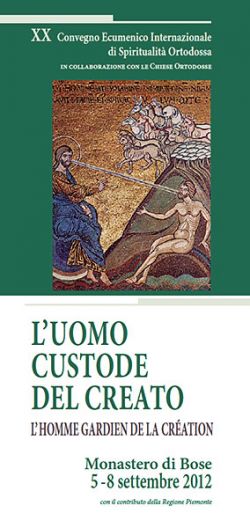Press release
MAN — CUSTODIAN OF CREATION
in collaboration with the Orthodox Churches
In the Christian tradition of East and West to live on earth is a task and a gift entrusted to human beings
XX International Ecumenical Conference
on Orthodox Spirituality
Bose, Wednesday 5 – Saturday 8 September 2012
in collaboration with the Orthodox Churches
The 20th International Ecumenical Conference on Orthodox Spirituality, which opens at Bose on Wednesday, 5 September, has for its theme “Man — Custodian of Creation”.
In the Christian tradition of East and West to live on earth is a task and a gift entrusted to human beings, custodians, but at the same time guests of creation. On this theme the opening feature talks by the prior of Bose, Enzo Bianchi, and the metropolitan of Pergamum, Ioannis Zizioulas, one of the major contemporary theologians and representative of the ecumenical patriarch Bartholomew I, who with great conviction and numerous initiatives has carried out a constant service in recalling the spiritual and Christian foundations of ecological commitment.
Metropolitans and bishops of the Orthodox Churches and of the Catholic Church (among these cardinal Roger Etchegaray, vice-dean of the College of Cardinals, Antonio Mennini, apostolic nuncio to Great Britain, bishop Mansueto Bianchi of Pistoia, president of the Commission for ecumenism and inter-religious dialogue of the Italian Bishops’ Conference), as well as representatives of the Anglican Church and the Churches of the Reform, of the World Council of Churches (Tamara Grdzelidze), and of the pontifical Council for promoting Christian unity (mons. Andrea Palmieri), in addition to theologians, patrologists, and scholars from all over the world.
In four days of meetings and discussions open to the public the speakers will look at the theological and spiritual dimensions of man’s relation with the environment that surrounds him, seeking the values that can inspire responsible choices to meet the ecological crisis, provoked by man himself, which is causing irreversible wounds to life on out planet.
The teaching of the Orthodox Church on ecological problems will be explained by bishop Amvrosij of Gat?ina, rector of the Theological Academy of St Petersburg and member of the official delegation of the Moscow Patriarchate, headed by metropolitan German of Volgograd.
The goodness of creation according to the Biblical account (Gen 1,31), the relationship between wounded and healed nature and the history of salvation (cf. Rom 8,22), the understanding of the relationship of man with creation in the church fathers, from Ireneus of Lyons to Maximus the Confessor to the Syriac fathers, is at the center of the reflections proposed by John Behr (New York), Nestor Kavvadas (Tübingen), Assaad Elias Kattan (Münster).
A panel presided by bishop Andrej of Remesiana, delegate of the Holy Synod of the Serbian Orthodox Church, will try to present the various perspectives offered by the monastic tradition in its relationship with the environment: from contemplation of nature in Byzantine literature and ascetical tradition (Antonio Rigo, member of the Scientific committee, Venice; Dimitrios Moschos, Athens) to the transformations of the natural space in monastic settlements of the Russian Far North (archimandrite Porfirij Šutov of Solovki, igumen Mitrofan Badanin of Varzuga) or in Cistercian abbeys in the West (Esther De Waal, Rowlestone). Asceticism and poverty of the monastic tradition are also an occasion for reflecting on respect for the earth and the sharing of its fruits in the consumer society.
In the eastern Christian tradition the liturgical celebration intimately includes the cosmos in the Church’s praise and adoration. Everything that lives and exists — trees, stones, the sun, and the moon — praise the Lord (Job Getcha, Paris). The eucharistic celebration is the highest form of a sacrifice of praise offered to the Father in which the believing assembly carries along all creation and all human history (archbishop Antonij of Boryspil’, Kiev). The cosmic dimension of the Christian liturgy finds expression in the iconography of creation (Anca Vasiliu, Paris) and is reflected in Russian thought (Pavel L. Gavrilyuk, St Paul, MN).
Scientists indicate the probability of the planet’s ecosystem collapsing, and this demands a renewed assumption of shared responsibility. A discussion on man and the ethics of creation, coordinated by Konstantin Sigov of Kiev, will include the views of metropolitan Serafim of Germany, delegate of the Romanian patriarch Daniel, the Orthodox theologian Elisabeth Theokritoff, author of a book on the Christian vision of ecology that has now been translated into Italian (Abitare la terra, Qiqajon 2012), and the Lebanese epistemologist Antoine Courban.
The final day, when the American Orthodox theologian John Chryssavgis and the former Benedictine abbot Michel van Parys, among others, will speak, will be an occasion to reflect how the wealth of the Orthodox spiritual tradition, in view of the urgent ecological problem, can meet the challenge of the complex situation triggered by the contemporary industrial and technological revolution.
The speakers will also include metropolitan Georges of Mount Lebanon (Antioch Patriarchate), bishop Stefan of Gomel' and Zhlobin (Belarusian Exarchate of the Patriarchate of Moscow), bishops Boris Agatonitsa, Kiprian of Traianopol (Patriarchate of Bulgaria), Ioannis of Thermopolis (Orthodox Church of Greece), and Melchisedek of Pittsburgh (Orthodox Church of America), father Zakaria Baghumian (Armenian Apostolic Church), delegate of the catholikos of all Armenians Karekin II, archimandrite Athenagoras Fasiolo (Orthodox Archdiocese of Italy and Malta), canon Hugh Wybrew (Church of England).
Of particular importance is the presence of monks and nuns from Orthodox monasteries (Greece, Russia. Bulgaria, Romania, Mount Sinai, Armenia, France, England, United States), Catholic and Reformed monasteries (Belgium, France, Italy, Switzerland, Hungary). We may also note the presence of Gelian Prochorov of St Petersburg, Aleksandr Ogorodnikov of Moscow, Spyridon Kontoyannis and Nikitas Aliprandis of Athens, Vasilije Grolimund of Geilnau.
